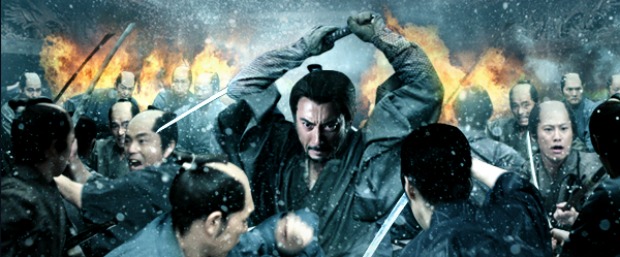Hara Kiri: Death of a Samurai
Takashi Miike’s latest outing is a long, drawn out expedition into the proud world of ritual suicides and the life of destitute, unnecessary samurai in a time of peace.
Plot summary
A tale of revenge, honour and disgrace, centering on a poverty-stricken samurai who discovers the fate of his ronin son-in-law, setting in motion a tense showdown of vengeance against the house of a feudal lord.

The title of this film is misleading. Yes, there is death. Yes, there are samurai. Well ok, I guess it isn’t that misleading. But surely the title implies a certain amount of fighting – of bloody gory, kick-ass samurai fighting?
You may have guessed from the tone that, no, it doesn’t. Instead Takashi Miike’s latest outing is a long, drawn out expedition into the proud world of ritual suicides and the life of destitute, unnecessary samurai in a time of peace. From the director of 13 Assassins and Ichi the Killer this is a considerable shift towards a tenser, more dramatic affair.
The opening 20 minutes to Hara Kiri set a brilliant tone that the rest of the film, until the end, sadly lets down. We find ourselves inside the house of Li where a poor, surplus Samurai arrives asking for a noble courtyard to be assisted with his ritual suicide. Seemingly sick of all the whiny samurai gracing their doorsteps looking for death, the houses’ noblemen feel it only right to tell the story of a Motome (Eita) who came too came asking for death. Performing what is known as a ‘suicide bluff’ – faking their desire of death in the hope their show of honour will grant them entry to the house, or at least a few pennies to be getting on with – we watch a humiliating and brutal death of a man armed only with a bamboo sword.
It’s a great introduction to the film; the adjacent stories of two men asking for their hara kiris. The quiet of these opening minutes, the traditions of the house and the ritual itself are moving and painful and as we draw to the link between the two men we, sadly, reach our first and last peak of interest for some time.
Miike essentially creates a family drama out of the next hour of film. Underlining the story may be the dissolving fortunes of the samurai as a whole, but what we see is the simple story of a father, his daughter Miho (Mitsushima) and his adopted son.
Hara Kiri: Death of a Samurai is screening as part of the 55th London Film Festival.











COMMENTS